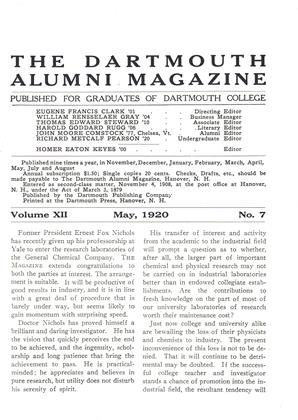Plans are being discussed at Dartmouth for assuring to all faculty members adequate insurance protection to fill the need left when the limits of expansion of the original Carnegie Teachers' Pension fund were reached. Early in April the faculty was called together at the Little Theatre to learn and discuss the insurance program drawn by a special faculty committee composed of C. H. Forsyth, C. A. Proctor and L. D. White.
No definite action was taken at the meeting, but proposals were presented for discussion somewhat as follows:
(1)that each member of the faculty or administrative staff of Dartmouth College, except those formally excused for reasons stated hereinafter, and except those who will have had less than three years' experience in collegiate teaching shall, after November 1, 1920, be required to be protected by either
(a) temporary insurance to articulate properly with an available Carnegie pension, to which the teacher shall contribute by deductions of at least one percent from his salary. or (b) insurance maturing as an endowment at an age not earlier than 60 or later than 70, and costing at least four per cent of his salary or whatever lower per cent of his salary will purchase protection of this form of a total amount equal to at least $6000. Any other form or forms of insurance may, however, be offered as an alternative fulfillment of this requirement which provide a sufficient cash surrender value at the age of retirement. Explicitly, the cash surrender value at age 65 must equal or exceed the amount of ordinary life insurance maturing as an endowment at age 65 which is purchasable at the attained age and which could otherwise be offered in fulfillment of the requirement.
The value of the salary in every case is to be taken as of November 1, 1920, or as soon thereafter as an individual comes within the terms of these requirements.
(2) that the college agree to contribute a like amount in addition toward such protection up to one percent of the salary in the case of temporary insurance, or up to four percent of the salary in the case of either endowment insurance* or the combination of decreasing insurance and deferred annuity, or up to the maximum limit specified above; with the understanding, however, that contribution is to be made by the college toward temporary insurance only, in case the member of the faculty or administrative staff is enrolled in the accepted list of the Carnegie Foundation.
(3) That upon subsequent increase in salary it be optional on the part of the member of the faculty or administrative staff to increase the amount of his protection by additional payments with the understanding that the College will supplement such additional payments by equal payments up to the percentage of salary as of that time that is specified above. When, however, the total face value of the protection received from the endowment insurance or the combination of decreasing insurance and deferred annuity shall have reached $12,000 all further obligations of the college shall cease.
(4) That participation in the contribution plan stated above be made optional on the part of members of the faculty of less than three years' experience in collegiate teaching.
(5) That in cases where sufficient evidence is presented to the president to show that the requirements stated above are either unnecessary or would cause undue hardship they may be waived either in whole or part as long as such evidence shall prove valid.
*Practically every life insurance company is willing — at least at a slightly additional cost — to change a whole life insurance policy to endow at some advanced age such as sixty-five. The cost of such change is much more than met in every case by the contribution to be made by the college.
 View Full Issue
View Full Issue
More From This Issue
-
 Article
ArticleTHE DRESDEN PRESS*
May 1920 By Harold Goddard Rugg -
 Article
ArticleDANIEL CROSBY GREENE
May 1920 By Philip Sanford Mar den '94 -
 Article
ArticleREPORT OF TRUSTEES' MEETING
May 1920 -
 Article
ArticleFormer President Ernest Fox Nichols has recently given up his professorship
May 1920 -
 Article
ArticlePRESIDENT HOPKINS AND MR. PARKHURST VISIT THE PACIFIC COAST ASSOCIATIONS
May 1920 -
 Class Notes
Class NotesCLASS OF 1917
May 1920 By William Sewall







